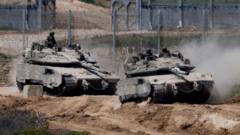In a significant military shift, Israel plans to expand its operations in Gaza, focusing on territorial control and increased pressure on Hamas while grappling with humanitarian implications.
**Escalating Conflict: Israel's Security Cabinet Approves Expanded Military Offensive in Gaza**

**Escalating Conflict: Israel's Security Cabinet Approves Expanded Military Offensive in Gaza**
Israel's leadership intensifies military efforts against Hamas amid concerns over hostages and humanitarian aid.
The Israeli security cabinet has greenlighted a comprehensive plan to broaden its military offensive against Hamas, marking a pivotal shift in strategy aimed at capturing and holding regions of Gaza. Tens of thousands of reservists have been activated as part of efforts to escalate military pressure and facilitate the release of Israeli hostages still held by Hamas.
According to reports, this plan is poised for implementation following the anticipated visit of U.S. President Donald Trump next week. Alongside military considerations, the cabinet has tentatively approved delivering humanitarian aid through private entities, a controversial decision that could end a two-month blockade. Humanitarian organizations, including the UN, have warned that such actions could undermine core humanitarian principles and their cooperation.
Prime Minister Benjamin Netanyahu's cabinet convened to discuss the offensive, which resumed after a two-month ceasefire on March 18. The unanimous decision involved a multi-month strategy emphasizing gradual expansion of ground operations in Gaza, particularly targeting areas along the borders with Israel and Egypt. This move is intended to bolster Israel’s negotiating power with Hamas over potential ceasefire terms and hostage release.
Netanyahu indicated that this operation diverges from prior military strategies by transitioning from rapid raids to an occupation model that maintains a sustained Israeli presence in Gaza. Israeli Chief of Staff, Lt Gen Eyal Zamid, outlined plans to strengthen operations and eliminate Hamas' infrastructure, asserting that this marks an escalation in pressure aimed at securing the release of hostages.
However, significant dissent has emerged. Critics argue that the strategy is flawed, as none of the remaining 59 hostages have been liberated since the offensive's resumption, and families representative of the hostages expressed that the Israeli government is valuing territorial gain over hostage safety, contradicting public sentiment among Israelis.
The humanitarian implications of the military operations have raised alarms, as the Humanitarian Country Team (HCT), comprised of UN agencies and aid organizations, disclosed that Israeli authorities may be seeking to disrupt current aid systems, further complicating distribution efforts for the vulnerable populations in Gaza.
With the ongoing blockade since March 2, the UN emphasizes that Israel has legal obligations to ensure the delivery of essential supplies to Gaza's 2.1 million residents, most of whom are displaced. The Israeli military’s offensive, which began after a deadly cross-border attack on October 7, 2023, has resulted in over 52,535 deaths in Gaza, raising urgent calls for reevaluation of both military tactics and humanitarian strategies in the region.
According to reports, this plan is poised for implementation following the anticipated visit of U.S. President Donald Trump next week. Alongside military considerations, the cabinet has tentatively approved delivering humanitarian aid through private entities, a controversial decision that could end a two-month blockade. Humanitarian organizations, including the UN, have warned that such actions could undermine core humanitarian principles and their cooperation.
Prime Minister Benjamin Netanyahu's cabinet convened to discuss the offensive, which resumed after a two-month ceasefire on March 18. The unanimous decision involved a multi-month strategy emphasizing gradual expansion of ground operations in Gaza, particularly targeting areas along the borders with Israel and Egypt. This move is intended to bolster Israel’s negotiating power with Hamas over potential ceasefire terms and hostage release.
Netanyahu indicated that this operation diverges from prior military strategies by transitioning from rapid raids to an occupation model that maintains a sustained Israeli presence in Gaza. Israeli Chief of Staff, Lt Gen Eyal Zamid, outlined plans to strengthen operations and eliminate Hamas' infrastructure, asserting that this marks an escalation in pressure aimed at securing the release of hostages.
However, significant dissent has emerged. Critics argue that the strategy is flawed, as none of the remaining 59 hostages have been liberated since the offensive's resumption, and families representative of the hostages expressed that the Israeli government is valuing territorial gain over hostage safety, contradicting public sentiment among Israelis.
The humanitarian implications of the military operations have raised alarms, as the Humanitarian Country Team (HCT), comprised of UN agencies and aid organizations, disclosed that Israeli authorities may be seeking to disrupt current aid systems, further complicating distribution efforts for the vulnerable populations in Gaza.
With the ongoing blockade since March 2, the UN emphasizes that Israel has legal obligations to ensure the delivery of essential supplies to Gaza's 2.1 million residents, most of whom are displaced. The Israeli military’s offensive, which began after a deadly cross-border attack on October 7, 2023, has resulted in over 52,535 deaths in Gaza, raising urgent calls for reevaluation of both military tactics and humanitarian strategies in the region.




















